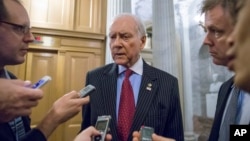White House and congressional negotiators moved toward wrapping up a tax and spending compromise Tuesday that would cap Congress' year, a package expected to lift the ban on U.S. oil exports and provide legislative goodies for home-state interests.
House Speaker Paul Ryan told GOP lawmakers he expected compromise legislation to be publicly released Tuesday – a measure that would deliver victories for to both sides. But the Wisconsin Republican provided few details. The remarks, which Ryan made in a conference call with fellow GOP legislators Monday, were conveyed by an official who described the private conversation on condition of anonymity.
A major priority for the GOP and some Democrats was lifting the 40-year-old bar against exporting U.S. crude oil, an upshot of the 1970's oil shortages that industry supporters consider unneeded with today's explosion of domestic oil extraction. Critics say ending the prohibition would be a windfall to big oil companies that would damage the environment by encouraging more drilling.
In exchange, Democrats were seeking concessions including renewing tax breaks for solar and wind energy producers for five years and reviving an environmental conservation fund. Democrats also wanted to block GOP efforts to roll back Obama administration environmental regulations, including one setting new emission standards for generating plants.
Settling disputes
Negotiators were sorting through remaining disputes over environment, labor and other provisions in a $1.1 trillion bill financing federal agencies for 2016. With temporary spending for the government expiring Wednesday night, lawmakers will likely need to approve another stopgap measure keeping agency doors open for a few more days while work on the leading-edge bill is finished.
Lobbyists said the spending package would likely lack a provision pushed by House Minority Leader Nancy Pelosi, D-California, easing curbs against gun violence research by the federal Centers for Disease Control and Prevention.
"There will be some elements of the budget bill that are not consistent with the kinds of policies that we have long supported,'' predicted White House spokesman Josh Earnest. “But that's the essence of compromise.”
Also in play were about 50 lapsed and expiring business and individual tax breaks that the two sides were looking to extend, in some cases permanently. The price tag of the overall package was unclear but it could mushroom to several hundred billion dollars over a decade, which would further add to federal deficits.
"If I can play it right, both sides should walk out of here feeling pretty good,'' said Senator Orrin Hatch, R-Utah, chairman of the tax-writing Senate Finance Committee.
Lobbyists said bargainers had tentatively agreed to postpone the launch of a tax on high-value health insurance plans from 2018 to 2020. There may also be a two-year pause in the existing 2.3 percent medical device tax and a one-year suspension of a levy currently imposed on health insurers, which the companies generally pass on to customers as higher premiums.
Those three taxes were boosted as part of President Barack Obama's 2010 health care overhaul to pay for the law's expanded coverage for millions of people. The administration has long resisted unraveling that statute, but there is strong bipartisan support in Congress for easing those taxes.
The two sides also considered making some expiring business tax credits permanent in exchange for doing the same to tax breaks for children, college students and lower-earning families.
Uncertainty continues
Yet uncertainty over trade-offs remains. It is possible that rather than accepting any such deals, Congress would settle for a more modest package extending expiring tax reductions for a year or two.
Senate Minority Leader Harry Reid, D-Nevada, seemed likely to win relief for Caesars Entertainment, one of his state's largest employers, in battles with some of its creditors as the company restructures its debt.
Senate Appropriations Committee Chairman Thad Cochran, R-Mississippi, was seeking to sharply boost government funding to help a huge coal-fired power plant in Kemper County implement new “clean coal'' technologies. Democratic aides said Cochran was seeking as much as $160 million for the project.
Similarly, Cochran was the prime force behind more than $600 million to construct an additional Coast Guard national security cutter that would be built by Ingalls Shipbuilding at its facility in Pascagoula, Mississippi. The Coast Guard has requested eight of the ships; Cochran would add the ninth.
There was also bipartisan support to ease new Federal Communications Commission rules that would restrict cost-saving advertising sales agreements between stations in the same community. The FCC says big media companies are exploiting the agreements to evade restrictions against owning multiple stations in the same market.









